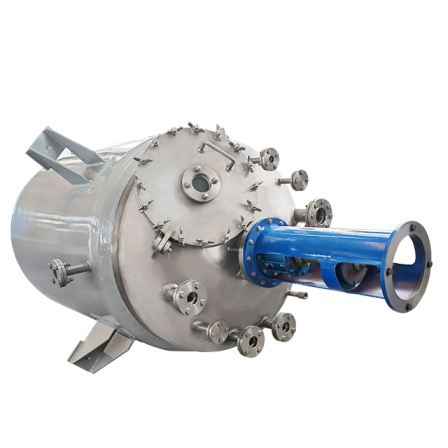Product list of jacketed reactor
1/6
CE EAC 2000L industry stainless steel reactor jacketed heating mechanical sealed sirrer for dye & synthetic
$4,250.00 - 8,250.00/Stand
14 years in business
Weihai Global Chemical Machinery Co., LtdTrading Area:Global
1/6
GSH-30L external circulation magnetic stainless steel reaction kettle
$4,850.00 - 7,000.00/Stand
14 years in business
Weihai Global Chemical Machinery Co., LtdTrading Area:Global
1/6
ASME-U EAC 5000L Explosion-proof jacketed magnetic sealed stainless steel hydrogenation reactor with
$9,500.00 - 16,800.00/Stand
14 years in business
Weihai Global Chemical Machinery Co., LtdTrading Area:Global
1/6
CE EAC ASME 25L high pressure high temp cryogenic double jacketed stainless steel premixed reactor IoT
$5,600.00 - 7,600.00/Stand
14 years in business
Weihai Global Chemical Machinery Co., LtdTrading Area:Global
1/6
WHGCM 15000L reactor stirred tank industrial jacketed biodiesel batch stainless steel resin chemical
$7,000.00 - 20,000.00/Stand
14 years in business
Weihai Global Chemical Machinery Co., LtdTrading Area:Global
1/6
20000L stainless steel cladding plate hydrogenation industrial reactor jacket coil automation PID intelligent
$7,500.00 - 26,800.00/Stand
14 years in business
Weihai Global Chemical Machinery Co., LtdTrading Area:Global
1/6
EAC 8000L high pressure high temperature outer half-tube limpet coil jacket cladding plate Industrial reactor
$56,000.00 - 68,000.00/Stand
14 years in business
Weihai Global Chemical Machinery Co., LtdTrading Area:Global
1/6
verified 6300L Stainless Steel high pressure temperature limpet coils jacket Polymerization Industry Reactor
$6,800.00 - 25,800.00/Stand
14 years in business
Weihai Global Chemical Machinery Co., LtdTrading Area:Global
1/2
SS316 Laboratory Scale 10L Stainless Steel Chemical Jacketed Reactor
$4,900.00 - 5,140.00/Set
18 years in business
Guangzhou Yuhua Instrument Co., LtdTrading Area:Global
1/3
Chemical Stainless Steel Jacketed Biodiesel Cbd Crystallazation Reactor Prices
$4,500.00 - 12,000.00/Set
18 years in business
Guangzhou Yuhua Instrument Co., LtdTrading Area:Global
1/5
Weihai huixin high pressure laboratory electric heating jacketed hydrogenation reactor
$1,100.00 - 5,500.00/Set
19 years in business
Weihai Huixin Chemical Machinery Co., LtdTrading Area:Global
1/5
20 L 100l 200l 300l 500l 1000l Pressure Continuous Stainless Steel Jacketed Reactor
$2,000.00 - 8,000.00/Set
14 years in business
Wenzhou Qiangzhong Machinery Technology Co., LtdTrading Area:Global
1/1
Polyol jacketed glass reactor 10l de biorreactor de precios
$500.00 - 3,000.00/Set
15 years in business
Shanghai Yuanhuai Industrial Co., LtdTrading Area:Global
About jacketed reactor
What is a jacketed reactor?
A jacketed reactor is a type of vessel used in chemical and pharmaceutical industries for mixing and reacting materials under controlled conditions. It has an outer jacket that is filled with a cooling or heating medium to help regulate the temperature of its contents.
What are the advantages of using a jacketed reactor?
Some of the advantages of using a jacketed reactor include: better control of temperature, reduced risk of thermal shock, improved heat transfer, and increased efficiency of reactions.
What materials are jacketed reactors made of?
Jacketed reactors can be made of a variety of materials, including glass, stainless steel, and other metals. The choice of material depends on the application, budget, and other factors.
What are the different types of jacketed reactors?
There are several types of jacketed reactors, including batch reactors, continuous stirred-tank reactors, plug flow reactors, and many others. Each has different features and applications to suit various needs and requirements.
What are the maintenance requirements of jacketed reactors?
Jacketed reactors require regular cleaning and maintenance to ensure proper operation and longevity. This includes checking for leaks, inspecting and repairing insulation, replacing damaged parts, and cleaning the inner vessel.











